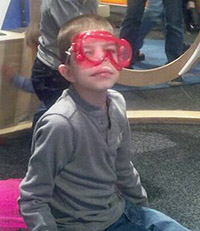Autism Help
 Receiving an autism diagnosis can be overwhelming. Whether you are the parent of a child with ASD, or an individual on the autism spectrum, you are likely faced with the question, “Now what do I do?” We at ABOARD’s Autism Connection of PA have been there, and we are here to help you. Please call us at 1-800-827-9385 or email us at support@AutismOfPA.org to get the answers you need.
Receiving an autism diagnosis can be overwhelming. Whether you are the parent of a child with ASD, or an individual on the autism spectrum, you are likely faced with the question, “Now what do I do?” We at ABOARD’s Autism Connection of PA have been there, and we are here to help you. Please call us at 1-800-827-9385 or email us at support@AutismOfPA.org to get the answers you need.
How We Can Help You
- Our helpful Family Service Coordinators are available from 10:00am to 3:00pm Monday through Friday to give you free counseling and autism support tailored to meet your needs. Call us or email us at 1-800-827-9385 or support@AutismOfPA.org
- Our Lending Library of Books and Media contains over 800 books, DVDs, videos, and other autism-related items. We ship for free to anywhere in Pennsylvania!
- Our regular autism conferences help you stay current with the latest autism research and therapies.
- Our community events are geared towards children and teens on the spectrum, and are a fun outing for the entire family.
- Get on our email list to receive the latest autism information through our weekly e-blast and our quarterly newsletter.
Our Tips for Meeting with Support Staff
- Keep a notebook to record what you are told by doctors and other professionals. Also use this notebook to write down your questions for them.
- Keep copies of test results, blood work, medication information, and therapy referrals in your notebook.
- Look for Internet articles to print and keep in your notebook. Highlight the parts that are of interest to you and discuss these parts with your doctors, teachers, and therapists.
- When you are meeting with your doctor, your therapist, or your school, make sure to dress professionally. These specialists will take you more seriously if you present yourself well.
- Bring a support person who can assist you, provide information about your child, and comfort you during your meetings.
- Take notes in meetings, and ask people to repeat anything you need to write down. This keeps track of what was said, and helps professionals to speak more clearly and specifically.
- Bring a calendar and flip it open at the end of a meeting, asking, “When do we meet next?” This prevents phone tag and “delay of game.”
Early Intervention (Birth to Age 3)
If the child is under three years of age and has special needs, the child may be eligible for an early intervention program. Early intervention programs are available in every state.
Early intervention services are provided by workers specially trained in caring for toddlers with disabilities. These services are usually provided in the home or another place familiar to the child.
An Individualized Family Service Plan (IFSP) is created that specifies the supports that will be provided to serve the needs of both the child and the family. This plan is reviewed at least twice a year. These services may include daily activities that the service providers offer for the child with autism, and may also include services for siblings.
Please contact us to learn more about early intervention programs.
Wraparound (Ages 3 to 21)
 Wraparound services are behavioral health rehabilitation supports that provide individualized, community-based care to children and adolescents with emotional or behavioral issues. These services allow at risk children to be reunited and/or remain with their families and communities.
Wraparound services are behavioral health rehabilitation supports that provide individualized, community-based care to children and adolescents with emotional or behavioral issues. These services allow at risk children to be reunited and/or remain with their families and communities.
Wraparound services take place in a non-clinical setting, such as in the home or the community, and allow the child to work, talk, and play with typically developing peers. Wraparound services center on the family, and are built upon the unique strengths of the child and their family members.
The initial treatment team includes the parents, a psychologist, and other support professionals. All members of the treatment team work in conjunction with the insurance company to determine which services are most needed, and what level of service is necessary to address the child’s needs.
Our Wraparound Directory contains a list of individuals and organizations in twenty-seven counties across Pennsylvania who provide Wraparound services to children, teens, and young adults on the autism spectrum.
Individualized Education Program (IEP)
 The Individuals with Disabilities Education Act (IDEA) is a Federally mandated program that assures a free and appropriate public education (also known as FAPE) for children with diagnosed learning deficits. When children are placed in public schools, the school district pays for all necessary services. If needed, these services may include work with a speech therapist, occupational therapist, school psychologist, social worker, school nurse, or classroom aide.
The Individuals with Disabilities Education Act (IDEA) is a Federally mandated program that assures a free and appropriate public education (also known as FAPE) for children with diagnosed learning deficits. When children are placed in public schools, the school district pays for all necessary services. If needed, these services may include work with a speech therapist, occupational therapist, school psychologist, social worker, school nurse, or classroom aide.
By law, public schools must prepare and implement a set of instruction goals for every child in a special education program. This list of goals is known as the child’s Individualized Education Program (IEP). For more information, please read the Pennsylvania Parent Guide to Special Education for School Age Children.
The IEP is a legal agreement between the school and the family specifying the child’s goals. When a child’s IEP is developed, the parents are asked to attend the planning meeting. In addition, both the school and the parents may invite other professionals to the meeting. These people may include:
- A special education teacher.
- A representative of the public schools who is knowledgeable about the program.
- Other ASD professionals invited by the school.
- Relatives of the child.
- A childcare provider, or a supportive close friend who knows the child well.
Parents play a critical role in creating the IEP, as they best know their child’s needs. Once a child’s IEP is developed, there is an annual meeting scheduled to review the child’s progress and refine the plan to reflect the child’s changing needs.
Parents can request an IEP meeting at any time during the year. If a problem arises, write to your child’s teacher or principal, asking to “reconvene the IEP team” to discuss the issue. The school has 10 school days to call a meeting. You can do this as many times as you need to during the year. Please contact us to learn more about the IEP process.
Providing Autism Support in Pennsylvania
412-781-4116 800-827-9385 support@AutismOfPA.org